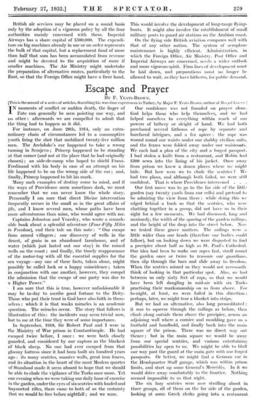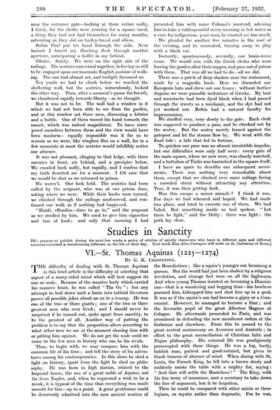Escape and Prayer
By F. YEATS-BROWN.
[This is the second of a series of articles, describing his war-time experiences in Turkey, by Major F. Yeats-Brown, author of Benyal Lwow.]
Fate can generally be seen pointing one way, and no other : afterwards we are compelled to admit that the thing had to happen as it did.
For instance, on June 28th, 1914, only an extra- ordinary chain of circumstances led to a consumptive youth firing the shot that mobilized twenty-five million men. The Archduke's car happened to take a wrong turning in Serajevo ; Princep happened to be standing at that corner (and not at the place that he had originally chosen) ; an aide-de-camp who hoped to shield Franz- Ferdinand with his body in case of an attempt on his life happened to be on the wrong side of the car ; and, finally, Princep happened to hit his mark.
Many such examples of destiny come to mind, and if the ways of Providence seem sometimes dark, we must remember that we can never know the whole story. Personally I am sure that direct Divine intervention frequently occurs in the small as in the great affairs of life, and I know several men, whose paths have been more adventurous than mine, who would agree with me. Captains Johnston and Yearsley, who wrote a remark- able book about a splendid adventure (Four-Filly Miles to Freedom), end their tale on this note : " Our escape from armed villagers ; our discovery of wells in the desert, of grain in an abandoned farmhouse, and of water (which just lasted out our stay) in the ruined wells on the coast ; and finally, the timely reappearance of the motor-tug with all the essential supplies for the sea voyage—any one of these facts, taken alone, might possibly be called luck or a happy coincidence ; taken in conjunction with one another, however, they compel the admission that the escape of our party was due to a Higher Power."
I am sure that this is true, however unfashionable it may be to-day to ascribe good fortune to the Deity. Those who put their trust in God have also faith in them- selves : which it is that works miracles is an academic question. The miracles occur. The story that follows is illustrative of this: the incidents may seem trivial now, but to me at the time they were of some importance.
In September, 1918, Sir Robert Paul and I were in the Ministry of War prison in Constantinople. He had escaped twice before, I once : we were both closely guarded, and considered by our captors as the blackest of black sheep. No one had ever escaped from that gloomy fortress since it bad been built six hundred years ago : its many sentries, massive walls, great iron fences, and its situation in the heart'of the most Moslem quarter of Stamboul made it seem absurd to hope that we should be able to elude the vigilance of the Turks once more. Yet one evening when we were taking our daily hour of exercise in the garden, under the eyes of six sentries with loaded and bayoneted rifles, there came to both of us the certainty that we would be free before nightfall ; and we were.
N moments of conflict or sudden death, the finger of Our confidence was not founded on prayer alone.
God helps those who help themselves, and we had helped ourselves to everything within reach of our powers of bribery or sleight of hand. We had both purchased several fathoms of rope by separate and barefaced intrigues, and a fez apiece : the rope was wound round our waists under our shabby civilian suits, and the fezzes were folded away under our waistcoats, We each had a plan of the city and a forged passport. I had stolen a knife from a restaurant, and Robin had £300 sewn into the lining of his jacket. Once away from prison we knew a dozen places where we might hide. But how were we to chide the sentries ? We had two plans, and although both failed, we were still confident. That is where Providence intervened . . .
Our first move was to go to the far side of the little garden (say twenty yards from our cells) and_ pretend to be admiring the view from there : while doing this we edged behind a bush so that the sentries, who were chatting together in a group, did not have us in their sight for a few moments. We had discussed, long and anxiously, the width of the spacing of the garden railings, and the height of the drop into the street below. Now we tested these grave matters. The railings were a little wider than our heads (therefore our bodies could follow), but on looking down we were disgusted to find is precipice about half as high as St. Paul's Cathedral. Our idea had been to make our ropes fast, stroll round the garden once or twice to reassure our guardians. then slip through the bars and slide away to freedom. When the sentries missed us they would not necessarily think of looking in that particular spot. Alas, we had between us only sixty feet of rope, so that we would have been left dangling in mid-air with six Turks practising their marksmanship on us from above. For to-night, at least, we were foiled in this direction : perhaps, later, we might tear a blanket into strips.
But we had an alternative, also long premeditated : it was to squeeze through the railings as before, then climb along outside them above the precipice, across au adjoining wall where a cornice and moulding gave us a foothold and handhold, and finally back into the main square of the prison. There was no direct way out thence.; but in the main square we would be away from our special sentries, and various entertaining possibilities lay open to us. We might be able to bluff our way past -the guard at the main gate with our forged passports. Or better, we might find a German car in the Headquarter Staff garage,- which was within prison limits, and start up some General's Mercedes. In it we would drive away comfortably to the frontier. Nothing seemed impossible to us that night.
The six lazy sentries were now strolling about in three groups, all of them on the far side of the garden, looking at some Greek clerks going into a restaurant near the entrance gate—looking at them rather sadly, I think, for the clerks were arriving for a square meal, a thing they had not had themselves for many months, subsisting as they did on barley-bread and olives.
Robin Paul put his hand through the rails. Next instant I forced my flinching flesh through another aperture, anticipating a bullet in my behind.
Silence. Safety. We were on the right side of the railings. The sentries conversed together, believing us still to be engaged upon our insensate English pastime of walk- ing. The sun had almost set, and twilight favoured us.
Ten yards we had to climb before we reached the sheltering wall, but the sentries, miraculously, looked the other way. Then, after a moment's pause for breath, we clambered rapidly towards liberty—as we thought.
But it was not to be. The wall had a window in it which we had not been able to see from the garden, and at this window sat three men, discussing a lobster and a bottle. One of them waved his hand towards the sunset, which was indeed magnificent. To have inter- posed ourselves between them and the view would have been madness : equally impossible was it for us to remain as we were, like wingless flies on a wall, for in a few moments at most the sentries would infallibly notice our absence.
It was not pleasant, clinging to that ledge, with three enemies in front, six behind, and a precipice below. We crawled back sadly, but rapidly, and I confess that my faith deserted me for a moment. I felt sure that we would be shot as we returned to prison.
We weren't. Our luck held. The sentries had been called by the sergeant, who was at our prison door, asking where we were. While their backs were turned, we climbed through the railings unobserved, and con- tinued our walk as if nothing had happened.
"Haid6, effendim—time to go in," said the sergeant as we strolled by him. We used to give him cigarettes and tins of food ; and only that morning I had presented him with some Colman's mustard, advising him to take a tablespoonful every morning in hot water as a cure for indigestion : poor man, he trusted me too much.
We pleaded for another five minutes in the cool of the evening, and he consented, turning away to play with a black cat.
Instantly, spontaneously, severally, our brain-wave came. We would mix with the Greek clerks who were leaving the garden after their supper, and pass out of prison with them. That was all we had to do—all we did.
There was a patch of deep shadow near the restaurant, made by a magnolia bush. Here we discarded our European hats and drew out our fezzes : without further disguise we were passable imitations of Greeks. My hair and moustache had been dyed black when I had passed through the streets as a mechanic, and the dye had not yet worked out. Robin had a natural faculty for impersonation. - We strolled very, very slowly to the gate. Each clerk was supposed to produce a pass, and be checked out by the sentry. But the sentry merely leaned against the gatepost and let the stream flaw by. We went with the flood tide : a tide that led to fortune.
To quicken our pace was an almost irresistible impulse, but our difficulties were only half over : every gate of the main square, where we now were, was closely watched, and a battalion of Turks was barracked in the square itself.
I have no space to describe our subsequent move- ments. There was nothing very remarkable about them, except that we climbed over some railings facing a crowded street without attracting any attention. True, it was then getting dark.
Was this escape a minor miracle ? I think it was. For days we had schemed and hoped. We had made two plans, and tried to execute one of them. We had failed. But something inside us had spoken. " Let there be light," said the Deity : there was light : the path lay clear.



































 Previous page
Previous page